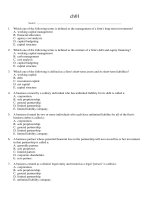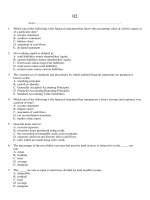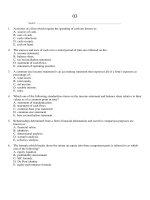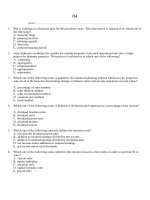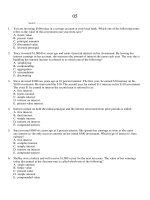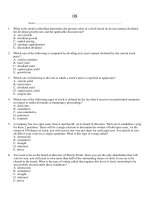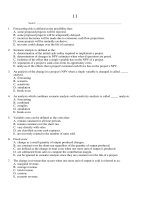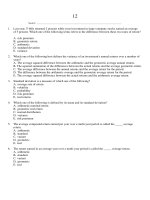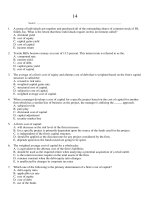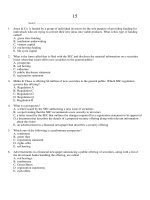Chapter 4 fundamentals of corporate finance 9th edition test bank
Bạn đang xem bản rút gọn của tài liệu. Xem và tải ngay bản đầy đủ của tài liệu tại đây (575.17 KB, 26 trang )
04
Student: ___________________________________________________________________________
1.
Phil is working on a financial plan for the next three years. This time period is referred to as which one of
the following?
A. financial range
B. planning horizon
C. planning agenda
D. short-run
E. current financing period
2.
Atlas Industries combines the smaller investment proposals from each operational unit into a single
project for planning purposes. This process is referred to as which one of the following?
A. conjoining
B. aggregation
C. conglomeration
D. appropriation
E. summation
3.
Which one of the following terms is applied to the financial planning method which uses the projected
sales level as the basis for determining changes in balance sheet and income statement account values?
A. percentage of sales method
B. sales dilution method
C. sales reconciliation method
D. common-size method
E. trend method
4.
Which one of the following terms is defined as dividends paid expressed as a percentage of net income?
A. dividend retention ratio
B. dividend yield
C. dividend payout ratio
D. dividend portion
E. dividend section
5.
Which one of the following correctly defines the retention ratio?
A. one plus the dividend payout ratio
B. addition to retained earnings divided by net income
C. addition to retained earnings divided by dividends paid
D. net income minus additions to retained earnings
E. net income minus cash dividends
6.
Which one of the following ratios identifies the amount of assets a firm needs in order to generate $1 in
sales?
A. current ratio
B. equity multiplier
C. retention ratio
D. capital intensity ratio
E. payout ratio
7.
The internal growth rate of a firm is best described as the:
A. minimum growth rate achievable assuming a 100 percent retention ratio.
B. minimum growth rate achievable if the firm maintains a constant equity multiplier.
C. maximum growth rate achievable excluding external financing of any kind.
D. maximum growth rate achievable excluding any external equity financing while maintaining a constant
debt-equity ratio.
E. maximum growth rate achievable with unlimited debt financing.
8.
The sustainable growth rate of a firm is best described as the:
A. minimum growth rate achievable assuming a 100 percent retention ratio.
B. minimum growth rate achievable if the firm maintains a constant equity multiplier.
C. maximum growth rate achievable excluding external financing of any kind.
D. maximum growth rate achievable excluding any external equity financing while maintaining a constant
debt-equity ratio.
E. maximum growth rate achievable with unlimited debt financing.
9.
You are developing a financial plan for a corporation. Which of the following questions will be
considered as you develop this plan?
I. How much net working capital will be needed?
II. Will additional fixed assets be required?
III. Will dividends be paid to shareholders?
IV. How much new debt must be obtained?
A. I and IV only
B. II and III only
C. I, III, and IV only
D. II, III, and IV only
E. I, II, III, and IV
10. Financial planning:
A. focuses solely on the short-term outlook for a firm.
B. is a process that firms employ only when major changes to a firm's operations are anticipated.
C. is a process that firms undergo once every five years.
D. considers multiple options and scenarios for the next two to five years.
E. provides minimal benefits for firms that are highly responsive to economic changes.
11. Financial planning accomplishes which of the following for a firm?
I. determination of asset requirements
II. development of plans to contend with unexpected events
III. establishment of priorities
IV. analysis of funding options
A. I and III only
B. II and IV only
C. I, III, and IV only
D. I, II, and III only
E. I, II, III, and IV
12. Which of the following questions are appropriate to address during the financial planning process?
I. Should the firm merge with a competitor?
II. Should additional shares of stock be sold?
III. Should a particular division be sold?
IV. Should a new product be introduced?
A. I, II, and III only
B. I, II, and IV only
C. I, III, and IV only
D. II, III, and IV only
E. I, II, III, and IV
13. Which one of the following statements concerning financial planning for a firm is correct?
A. Financial planning for fixed assets is done on a segregated basis within each division.
B. Financial plans often contain alternative options based on economic developments.
C. Financial plans frequently contain conflicting goals.
D. Financial plans assume that firms obtain no additional external financing.
E. The financial planning process is based on a single set of economic assumptions.
14. You are getting ready to prepare pro forma statements for your business. Which one of the following are
you most apt to estimate first as you begin this process?
A. fixed assets
B. current expenses
C. sales forecast
D. projected net income
E. external financing need
15. Which one of the following statements is correct?
A. Pro forma statements must assume that no new equity is issued.
B. Pro forma statements are projections, not guarantees.
C. Pro forma statements are limited to a balance sheet and income statement.
D. Pro forma financial statements must assume that no dividends will be paid.
E. Net working capital needs are excluded from pro forma computations.
16. When utilizing the percentage of sales approach, managers:
I. estimate company sales based on a desired level of net income and the current profit margin.
II. consider only those assets that vary directly with sales.
III. consider the current production capacity level.
IV. can project both net income and net cash flows.
A. I and II only
B. II and III only
C. III and IV only
D. I, III, and IV only
E. II, III, and IV only
17. Which one of the following is correct in relation to pro forma statements?
A. Fixed assets must increase if sales are projected to increase.
B. Net working capital is affected only when a firm's sales are expected to exceed the firm's current
production capacity.
C. The addition to retained earnings is equal to net income plus dividends paid.
D. Long-term debt varies directly with sales when a firm is currently operating at maximum capacity.
E. Inventory changes are directly proportional to sales changes.
18. When constructing a pro forma statement, net working capital generally:
A. remains fixed.
B. varies only if the firm is currently producing at full capacity.
C. varies only if the firm maintains a fixed debt-equity ratio.
D. varies only if the firm is producing at less than full capacity.
E. varies proportionally with sales.
19. A pro forma statement indicates that both sales and fixed assets are projected to increase by 7 percent
over their current levels. Given this, you can safely assume that the firm:
A. is projected to grow at the internal rate of growth.
B. is projected to grow at the sustainable rate of growth.
C. currently has excess capacity.
D. is currently operating at full capacity.
E. retains all of its net income.
20. A firm is currently operating at full capacity. Net working capital, costs, and all assets vary directly with
sales. The firm does not wish to obtain any additional equity financing. The dividend payout ratio is
constant at 40 percent. If the firm has a positive external financing need, that need will be met by:
A. accounts payable.
B. long-term debt.
C. fixed assets.
D. retained earnings.
E. common stock.
21. Which one of the following policies most directly affects the projection of the retained earnings balance
to be used on a pro forma statement?
A. net working capital policy
B. capital structure policy
C. dividend policy
D. capital budgeting policy
E. capacity utilization policy
22. You are comparing the current income statement of a firm to the pro forma income statement for next
year. The pro forma is based on a four percent increase in sales. The firm is currently operating at 85
percent of capacity. Net working capital and all costs vary directly with sales. The tax rate and the
dividend payout ratio are fixed. Given this information, which one of the following statements must be
true?
A. The projected net income is equal to the current year's net income.
B. The tax rate will increase at the same rate as sales.
C. Retained earnings will increase by four percent over its current level.
D. Total assets will increase by less than four percent.
E. Total liabilities and owners' equity will increase by four percent.
23. A firm is operating at 90 percent of capacity. This information is primarily needed to project which one of
the following account values when compiling pro forma statements?
A. sales
B. costs of goods sold
C. accounts receivable
D. fixed assets
E. long-term debt
24. Which one of the following capital intensity ratios indicates the largest need for fixed assets per dollar of
sales?
A. 0.70
B. 0.86
C. 1.00
D. 1.06
E. 1.15
25. Which of the following are needed to determine the amount of fixed assets required to support each dollar
of sales?
I. current amount of fixed assets
II. current sales
III. current level of operating capacity
IV. projected growth rate of sales
A. I and III only
B. II and IV only
C. I, II, and III only
D. II, III, and IV only
E. I, II, III, and IV
26. The plowback ratio is:
A. equal to net income divided by the change in total equity.
B. the percentage of net income available to the firm to fund future growth.
C. equal to one minus the retention ratio.
D. the change in retained earnings divided by the dividends paid.
E. the dollar increase in net income divided by the dollar increase in sales.
27. A firm's net working capital and all of its expenses vary directly with sales. The firm is operating
currently at 96 percent of capacity. The firm wants no additional external financing of any kind. Which
one of the following statements related to the firm's pro forma statements for next year must be correct?
A. Total liabilities will remain constant at this year's value.
B. The maximum rate of sales increase is 4 percent.
C. The firm cannot exceed its internal rate of growth.
D. The projected owners' equity will equal this year's ending equity balance.
E. Fixed assets must remain constant at the current level.
28. Which one of the following will increase the maximum rate of growth a corporation can achieve?
A. avoidance of external equity financing
B. increase in corporate tax rates
C. reduction in the retention ratio
D. decrease in the dividend payout ratio
E. decrease in sales given a positive profit margin
29. Martin Aerospace is currently operating at full capacity based on its current level of assets. Sales are
expected to increase by 4.5 percent next year, which is the firm's internal rate of growth. Net working
capital and operating costs are expected to increase directly with sales. The interest expense will remain
constant at its current level. The tax rate and the dividend payout ratio will be held constant. Current and
projected net income is positive. Which one of the following statements is correct regarding the pro forma
statement for next year?
A. The pro forma profit margin is equal to the current profit margin.
B. Retained earnings will increase at the same rate as sales.
C. Total assets will increase at the same rate as sales.
D. Long-term debt will increase in direct relation to sales.
E. Owners' equity will remain constant.
30. A firm's external financing need is financed by which of the following?
A. retained earnings
B. net working capital and retained earnings
C. net income and retained earnings
D. debt or equity
E. owners' equity, including retained earnings
31. Sales can often increase without increasing which one of the following?
A. accounts receivable
B. cost of goods sold
C. accounts payable
D. fixed assets
E. inventory
32. Blasco Industries is currently at full-capacity sales. Which one of the following is limiting sales to this
level?
A. net working capital
B. long-term debt
C. inventory
D. fixed assets
E. debt-equity ratio
33. All else constant, which one of the following will increase the internal rate of growth?
A. decrease in the retention ratio
B. decrease in net income
C. increase in the dividend payout ratio
D. decrease in total assets
E. increase in costs of goods sold
34. The external financing need:
A. will limit growth if unfunded.
B. is unaffected by the dividend payout ratio.
C. must be funded by long-term debt.
D. ignores any changes in retained earnings.
E. considers only the required increase in fixed assets.
35. Which one of the following will cause the sustainable growth rate to equal to internal growth rate?
A. dividend payout ratio greater than 1.0
B. debt-equity ratio of 1.0
C. retention ratio between 0.0 and 1.0
D. equity multiplier of 1.0
E. zero dividend payments
36. The sustainable growth rate:
A. assumes there is no external financing of any kind.
B. assumes no additional long-term debt is available.
C. assumes the debt-equity ratio is constant.
D. assumes the debt-equity ratio is 1.0.
E. assumes all income is retained by the firm.
37. If a firm equates its pro forma sales growth to the rate of sustainable growth, and has positive net income
and excess capacity, then the:
A. maximum capacity level will have to increase at the same rate as sales growth.
B. total assets will have to increase at the same rate as sales growth.
C. debt-equity ratio will increase.
D. retained earnings will increase.
E. number of common shares outstanding will increase.
38. Sal's Pizza has a dividend payout ratio of 10 percent. The firm does not want to issue additional equity
shares but does want to maintain its current debt-equity ratio and its current dividend policy. The firm is
profitable. Which one of the following defines the maximum rate at which this firm can grow?
A. internal growth rate × (1 - 0.10)
B. sustainable growth rate × (1 - 0.10)
C. internal growth rate
D. sustainable growth rate
E. zero percent
39. Which of the following can affect a firm's sustainable rate of growth?
I. capital intensity ratio
II. profit margin
III. dividend policy
IV. debt-equity ratio
A. III only
B. I and III only
C. II, III, and IV only
D. I, II, and IV only
E. I, II, III, and IV
40. Financial plans generally tend to ignore which one of the following?
A. dividend policy
B. manager's goals and objectives
C. risks associated with cash flows
D. operating capacity levels
E. capital structure policy
41. The financial planning process tends to place the least emphasis on which one of the following?
A. growth limitations
B. capacity utilization
C. market value of a firm
D. capital structure of a firm
E. dividend policy
42. The financial planning process:
I. involves internal negotiations among divisions.
II. quantifies senior manager's goals.
III. considers only internal factors.
IV. reconciles company activities across divisions.
A. III and IV only
B. II and III only
C. I, II, and IV only
D. II, III, and IV only
E. I, II, III, and IV
43. A Procrustes approach to financial planning is based on:
A. a policy of producing a financial plan once every five years.
B. developing a plan around the goals of senior managers.
C. a proactive approach to the economic outlook.
D. a flexible capital budget.
E. a flexible capital structure.
44. Fresno Salads has current sales of $4,900 and a profit margin of 6.5 percent. The firm estimates that sales
will increase by 5 percent next year and that all costs will vary in direct relationship to sales. What is the
pro forma net income?
A. $303.33
B. $327.18
C. $334.43
D. $338.70
E. $341.10
45. Wagner Industrial Motors, which is currently operating at full capacity, has sales of $29,000, current
assets of $1,600, current liabilities of $1,200, net fixed assets of $27,500, and a 5 percent profit margin.
The firm has no long-term debt and does not plan on acquiring any. The firm does not pay any dividends.
Sales are expected to increase by 4.5 percent next year. If all assets, short-term liabilities, and costs vary
directly with sales, how much additional equity financing is required for next year?
A. -$259.75
B. -$201.19
C. $967.30
D. $1,099.08
E. $1,515.25
46. The Cookie Shoppe expects sales of $437,500 next year. The profit margin is 4.8 percent and the firm has
a 30 percent dividend payout ratio. What is the projected increase in retained earnings?
A. $14,700
B. $17,500
C. $18,300
D. $20,600
E. $21,000
47. Gladsden Refinishers currently has $21,900 in sales and is operating at 45 percent of the firm's capacity.
What is the full capacity level of sales?
A. $31,755
B. $36,250
C. $48,667
D. $51,333
E. $54,500
48. The Corner Store has $219,000 of sales and $187,000 of total assets. The firm is operating at 87 percent
of capacity. What is the capital intensity ratio at full capacity?
A. 0.62
B. 0.68
C. 0.74
D. 1.35
E. 1.47
49. Miller Bros. Hardware is operating at full capacity with a sales level of $689,700 and fixed assets of
$468,000. The profit margin is 7 percent. What is the required addition to fixed assets if sales are to
increase by 10 percent?
A. $3,276
B. $4,680
C. $28,400
D. $32,760
E. $46,800
50. Designer's Outlet has a capital intensity ratio of 0.87 at full capacity. Currently, total assets are $48,900
and current sales are $52,300. At what level of capacity is the firm currently operating?
A. 89 percent
B. 91 percent
C. 93 percent
D. 96 percent
E. 98 percent
51. Monika's Dinor is operating at 94 percent of its fixed asset capacity and has current sales of $611,000.
How much can the firm grow before any new fixed assets are needed?
A. 4.99 percent
B. 5.78 percent
C. 6.02 percent
D. 6.38 percent
E. 6.79 percent
52. Stop and Go has a 4.5 percent profit margin and a 15 percent dividend payout ratio. The total asset
turnover is 1.6 and the debt-equity ratio is 0.60. What is the sustainable rate of growth?
A. 9.13 percent
B. 9.54 percent
C. 9.89 percent
D. 10.26 percent
E. 10.85 percent
53. R. N. C., Inc. desires a sustainable growth rate of 4.5 percent while maintaining a 40 percent dividend
payout ratio and a 6 percent profit margin. The company has a capital intensity ratio of 1.23. What equity
multiplier is required to achieve the company's desired rate of growth?
A. 1.33
B. 1.38
C. 1.42
D. 1.47
E. 1.53
54. A firm has a retention ratio of 45 percent and a sustainable growth rate of 6.2 percent. The capital
intensity ratio is 1.2 and the debt-equity ratio is 0.64. What is the profit margin?
A. 6.28 percent
B. 7.67 percent
C. 9.47 percent
D. 12.38 percent
E. 14.63 percent
55. Frasier Cabinets wants to maintain a growth rate of 5 percent without incurring any additional equity
financing. The firm maintains a constant debt-equity ratio of .0.55, a total asset turnover ratio of 1.30, and
a profit margin of 9.0 percent. What must the dividend payout ratio be?
A. 26.26 percent
B. 38.87 percent
C. 49.29 percent
D. 61.13 percent
E. 73.74 percent
56. Cross Town Express has sales of $132,000, net income of $12,600, total assets of $98,000, and total
equity of $45,000. The firm paid $7,560 in dividends and maintains a constant dividend payout ratio.
Currently, the firm is operating at full capacity. All costs and assets vary directly with sales. The firm
does not want to obtain any additional external equity. At the sustainable rate of growth, how much new
total debt must the firm acquire?
A. $0
B. $4,311
C. $5,989
D. $6,207
E. $6,685
57. The Two Sisters has a 9 percent return on assets and a 75 percent retention ratio. What is the internal
growth rate?
A. 6.50 percent
B. 6.75 percent
C. 6.97 percent
D. 7.24 percent
E. 7.38 percent
58. The Dog House has net income of $3,450 and total equity of $8,600. The debt-equity ratio is 0.60 and the
payout ratio is 20 percent. What is the internal growth rate?
A. 14.47 percent
B. 17.78 percent
C. 25.09 percent
D. 29.40 percent
E. 33.33 percent
59. What is Major Manuscripts, Inc.'s retention ratio?
A. 33 percent
B. 40 percent
C. 50 percent
D. 60 percent
E. 67 percent
60. Major Manuscripts, Inc. does not want to incur any additional external financing. The dividend payout
ratio is constant. What is the firm's maximum rate of growth?
A. 7.44 percent
B. 7.78 percent
C. 9.26 percent
D. 9.75 percent
E. 10.90 percent
61. If Major Manuscripts, Inc. decides to maintain a constant debt-equity ratio, what rate of growth can it
maintain assuming that no additional external equity financing is available.
A. 10.23 percent
B. 10.49 percent
C. 10.90 percent
D. 11.27 percent
E. 11.65 percent
62. Major Manuscripts, Inc. is currently operating at maximum capacity. All costs, assets, and current
liabilities vary directly with sales. The tax rate and the dividend payout ratio will remain constant.
How much additional debt is required if no new equity is raised and sales are projected to increase by 8
percent?
A. -$157
B. -$68
C. $241
D. $348
E. $367
63. Major Manuscripts, Inc. is currently operating at 85 percent of capacity. All costs and net working
capital vary directly with sales. The tax rate, the profit margin, and the dividend payout ratio will remain
constant. How much additional debt is required if no new equity is raised and sales are projected to
increase by 15 percent?
A. -$810
B. -$756
C. -$642
D. $244
E. $358
64. Assume the profit margin and the payout ratio of Major Manuscripts, Inc. are constant. If sales increase
by 6 percent, what is the pro forma retained earnings?
A. $5,220.18
B. $5,721.42
C. $6,021.56
D. $6,648.42
E. $7,028.56
65. Assume that Major Manuscripts, Inc. is currently operating at 95 percent of capacity and that sales are
projected to increase to $20,000. What is the projected addition to fixed assets?
A. $0
B. $1,493
C. $1,529
D. $1,546
E. $1,588
66. All of Fake Stone's costs and net working capital vary directly with sales. Sales are projected to increase
by 3.5 percent. What is the pro forma accounts receivable balance for next year?
A. $1,659.80
B. $1,661.84
C. $1,780.20
D. $1,787.80
E. $1,800.46
67. The profit margin, the debt-equity ratio, and the dividend payout ratio for Fake Stone, Inc. are constant.
Sales are expected to increase by $1,062 next year. What is the projected addition to retained earnings for
next year?
A. $92.34
B. $188.55
C. $1,909.16
D. $2,144.34
E. $2,386.08
68. Assume that Fake Stone, Inc. is operating at full capacity. Also assume that all costs, net working capital,
and fixed assets vary directly with sales. The debt-equity ratio and the dividend payout ratio are constant.
What is the pro forma net fixed asset value for next year if sales are projected to increase by 7.5 percent?
A. $19,800
B. $21,070
C. $23,600
D. $24,240
E. $26,810
69. Assume that Fake Stone, Inc. is operating at 88 percent of capacity. All costs and net working capital
vary directly with sales. What is the amount of the pro forma net fixed assets for next year if sales are
projected to increase by 13 percent?
A. $19,600
B. $20,406
C. $21,500
D. $21,667
E. $22,148
70. Assume that Fake Stone, Inc. is operating at full capacity. Also assume that assets, costs, and current
liabilities vary directly with sales. The dividend payout ratio is constant. What is the external financing
need if sales increase by 12 percent?
A. -$318.09
B. -$268.49
C. $103.13
D. $350.40
E. $460.56
71. Fake Stone, Inc. is projecting sales to decrease by 4 percent next year while the profit margin remains
constant. The firm wants to increase the dividend payout ratio by 2 percent. What is the projected
increase in retained earnings for next year?
A. $1,711.15
B. $1,898.67
C. $1,943.65
D. $1,969.92
E. $2,105.63
72. What is the internal growth rate of Fake Stone, Inc. assuming the payout ratio remains constant?
A. 5.20 percent
B. 5.55 percent
C. 7.36 percent
D. 7.49 percent
E. 8.77 percent
73. What are the pro forma retained earnings for next year if Fake Stone, Inc. grows at a rate of 2.5 percent
and both the profit margin and the dividend payout ratio remain constant?
A. $4,946.90
B. $5,023.10
C. $5,592.20
D. $5,920.67
E. $6,293.30
74. Assume that net working capital and all of the costs of Fake Stone, Inc. increase directly with sales. Also
assume that the tax rate and the dividend payout ratio are constant. The firm is currently operating at full
capacity. What is the external financing need if sales increase by 4 percent?
A. -$1,214.48
B. -$804.15
C. -$397.19
D. $201.16
E. $525.38
75. Hungry Howie's is currently operating at 78 percent of capacity. What is the full-capacity level of sales?
A. $21,106.00
B. $21,580.62
C. $22,179.49
D. $24,506.17
E. $25,301.91
76. Hungry Howie's is currently operating at 82 percent of capacity. What is the total asset turnover ratio at
full capacity?
A. .68
B. .78
C. .95
D. 1.29
E. 1.46
77. Hungry Howie's is currently operating at 96 percent of capacity. The profit margin and the dividend
payout ratio are projected to remain constant. Sales are projected to increase by 3 percent next year. What
is the projected addition to retained earnings for next year?
A. $1,309.19
B. $1,421.40
C. $1,884.90
D. $2,667.78
E. $3,001.40
78. Hungry Howie's is currently operating at full capacity. The profit margin and the dividend payout ratio
are held constant. Net working capital and fixed assets vary directly with sales. Sales are projected to
increase by 11 percent. What is the external financing needed?
A. -$196.50
B. -$148.00
C. -$97.20
D. -$14.50
E. $26.80
79. Hungry Howie's maintains a constant payout ratio. The firm is currently operating at full capacity. What
is the maximum rate at which the firm can grow without acquiring any additional external financing?
A. 9.74 percent
B. 10.52 percent
C. 11.06 percent
D. 11.58 percent
E. 12.23 percent
80. Hungry Howie's is currently operating at 94 percent of capacity. What is the required increase in fixed
assets if sales are projected to increase by 14 percent?
A. $0
B. $511
C. $633
D. $708
E. $777
81. Why do financial managers need to understand the implications of both the internal and the sustainable
rates of growth?
82. Identify the four primary determinants of a firm's growth and explain how each factor could either add to
or limit the growth potential of a firm.
83. A) What are the assumptions that underlie the internal growth rate and B) what are the implications of
this rate?
84. Nelson's Landscaping Services just completed a pro forma statement using the percentage of sales
approach. The pro forma has a projected external financing need of -$5,500. What are the firm's options
in this case?
85. Smith & Daughters is getting ready to compile pro forma statements for the next few years. How can
the managers establish a reasonable range of growth rates that they should consider during this planning
process?
86. The most recent financial statements for Watchtower, Inc. are shown here (assuming no income taxes):
Assets and costs are proportional to sales. Debt and equity are not. No dividends are paid. Next year's
sales are projected to be $5,002. What is the amount of the external financing need?
A. $197
B. $203
C. $211
D. $218
E. $223
87. The most recent financial statements for Last in Line, Inc. are shown here:
Assets and costs are proportional to sales. Debt and equity are not. A dividend of $992 was paid, and the
company wishes to maintain a constant payout ratio. Next year's sales are projected to be $21,830. What
is the amount of the external financing need?
A. $12,711
B. $13,333
C. $13,556
D. $13,809
E. $14,357
88. The most recent financial statements for 7 Seas, Inc. are shown here:
Assets, costs, and current liabilities are proportional to sales. Long-term debt and equity are not. The
company maintains a constant 50 percent dividend payout ratio. Like every other firm in its industry, next
year's sales are projected to increase by exactly 16 percent. What is the external financing need?
A. $1,241.76
B. $1,411.16
C. $1,583.09
D. $2,211.87
E. $2,349.98
89. The most recent financial statements for Benatar Co. are shown here:
Assets and costs are proportional to sales. Debt and equity are not. The company maintains a constant 40
percent dividend payout ratio. No external equity financing is possible. What is the internal growth rate?
A. 2.91 percent
B. 3.44 percent
C. 3.87 percent
D. 4.02 percent
E. 4.14 percent
90. The most recent financial statements for Heng Co. are shown here:
Assets and costs are proportional to sales. The company maintains a constant 40 percent dividend payout
ratio and a constant debt-equity ratio. What is the maximum increase in sales that can be sustained next
year assuming no new equity is issued?
A. $4,808.12
B. $5,211.17
C. $5,987.48
D. $6,493.74
E. $6,666.67
91. Consider the income statement for Heir Jordan Corporation:
A 22 percent growth rate in sales is projected. What is the pro forma addition to retained earnings
assuming all costs vary proportionately with sales?
A. $6,299
B. $7,303
C. $7,890
D. $8,011
E. $8,164
92. The Soccer Shoppe has a 7 percent return on assets and a 25 percent payout ratio. What is its internal
growth rate?
A. 3.72 percent
B. 4.08 percent
C. 4.49 percent
D. 5.23 percent
E. 5.54 percent
93. The Parodies Corp. has a 22 percent return on equity and a 23 percent payout ratio. What is its sustainable
growth rate?
A. 18.68 percent
B. 19.25 percent
C. 19.49 percent
D. 20.39 percent
E. 22.00 percent
94. Consider the following information for Kaleb's Kickboxing:
What is the sustainable rate of growth?
A. 13.87 percent
B. 14.29 percent
C. 14.65 percent
D. 15.42 percent
E. 15.58 percent
95. What is the sustainable growth rate assuming the following ratios are constant?
A. 10.30 percent
B. 10.53 percent
C. 10.67 percent
D. 10.89 percent
E. 11.01 percent
96. Seaweed Mfg., Inc. is currently operating at only 81 percent of fixed asset capacity. Current sales are
$550,000. What is the maximum rate at which sales can grow before any new fixed assets are needed?
A. 14.23 percent
B. 14.47 percent
C. 15.03 percent
D. 22.87 percent
E. 23.46 percent
97. Seaweed Mfg., Inc. is currently operating at only 86 percent of fixed asset capacity. Fixed assets are
$387,000. Current sales are $510,000 and are projected to grow to $664,000. What amount must be spent
on new fixed assets to support this growth in sales?
A. $0
B. $22,654
C. $46,319
D. $79,408
E. $93,608
98. Fixed Appliance Co. wishes to maintain a growth rate of 8 percent a year, a constant debt-equity ratio of
0.34, and a dividend payout ratio of 52 percent. The ratio of total assets to sales is constant at 1.3. What
profit margin must the firm achieve?
A. 13.92 percent
B. 14.46 percent
C. 14.97 percent
D. 15.33 percent
E. 15.74 percent
99. A firm wishes to maintain a growth rate of 8 percent and a dividend payout ratio of 62 percent. The ratio
of total assets to sales is constant at 1, and the profit margin is 10 percent. What must the debt-equity ratio
be if the firm wishes to keep that ratio constant?
A. 0.05
B. 0.40
C. 0.55
D. 0.60
E. 0.95
100.A firm wishes to maintain an internal growth rate of 11 percent and a dividend payout ratio of 24 percent.
The current profit margin is 10 percent and the firm uses no external financing sources. What must the
total asset turnover rate be?
A. 0.87 times
B. 0.90 times
C. 1.01 times
D. 1.15 times
E. 1.30 times
101.Based on the following information, what is the sustainable growth rate of Hendrix Guitars, Inc.?
A. 7.68 percent
B. 9.52 percent
C. 11.12 percent
D. 13.49 percent
E. 14.41 percent
102.Country Comfort, Inc. had equity of $150,000 at the beginning of the year. At the end of the year, the
company had total assets of $195,000. During the year, the company sold no new equity. Net income for
the year was $72,000 and dividends were $44,640. What is the sustainable growth rate?
A. 15.32 percent
B. 15.79 percent
C. 17.78 percent
D. 18.01 percent
E. 18.24 percent
103.The most recent financial statements for Moose Tours, Inc. follow. Sales for 2009 are projected to grow
by 16 percent. Interest expense will remain constant; the tax rate and dividend payout rate will also
remain constant. Costs, other expenses, current assets, and accounts payable increase spontaneously will
sales. If the firm is operating at full capacity and no new debt or equity is issued, how much external
financing is needed to support the 16 percent growth rate in sales?
A. $-10,246
B. -$8,122
C. -$6,708
D. $2,407
E. $3,309
04 Key
1. B
2. B
3. A
4. C
5. B
6. D
7. C
8. D
9. E
10. D
11. E
12. E
13. B
14. C
15. B
16. C
17. E
18. E
19. D
20. B
21. C
22. D
23. D
24. E
25. C
26. B
27. C
28. D
29. C
30. D
31. D
32. D
33. D
34. A
35. D
36. C
37. D
38. D
39. E
40. C
41. C
42. C
43. B
44. C
45. A
46. A
47. C
48. C
49. E
50. C
51. D
52. E
53. D
54. E
55. E
56. E
57. D
58. C
59. D
60. A
61. C
62. A
63. B
64. C
65. B
66. C
67. D
68. B
69. A
70. E
71. C
72. E
73. E
74. A
75. C
76. E
77. B
78. B
79. B
80. E
Feedback: Refer to section 4.4
81. Working capital, fixed assets, and external financing must coordinate with and be able to support a firm's sales growth. If, for example,
a projected increase in sales requires external financing when no such financing is available, then the firm cannot grow at the desired rate.
Understanding the implications of both the internal and the sustainable growth rates helps managers understand the need to limit growth so that the
firm does not attempt to outgrow its resources.
Feedback: Refer to section 4.4
82. The four factors are:
Feedback: Refer to section 4.4
The implication is that firms are limited to a rate of growth equal to the internal growth rate so long as external financing remains limited at its
current level. In other words, the internal growth rate is the maximum rate of growth a firm can achieve based on internally generated funds.
83. The basic assumptions are: Costs and net working capital increase proportionately with sales. Fixed assets also increase proportionately with
sales once production reaches full capacity. The dividend payout ratio is constant. No additional external financing of any kind is permissible.
Feedback: Refer to section 4.3
84. With a negative external financing need, the firm has a surplus of funds that it can use to reduce current liabilities, reduce long-term debt,
buy back common stock, or increase dividends. If acceptable opportunities exist, the firm might also use the extra funds to purchase fixed assets
thereby increasing its maximum capacity level, should that need be anticipated.
Feedback: Refer to section 4.4
85. The internal growth rate establishes the minimum desired rate of growth while the sustainable growth rate identifies the maximum supportable
level of growth. These growth rates effectively determine the range of rates than managers should consider.
86. B
87. E
88. A
89. C
90. D
91. E
92. E
93. D
94. C
95. B
96. E
97. C
98. C
99. E
100. E
101. B
102. E
103. B
04 Summary
Category
AACSB: Analytic
AACSB: N/A
AACSB: Reflective thinking
Difficulty: Basic
Difficulty: Intermediate
EOC #: 4-12
EOC #: 4-13
EOC #: 4-14
EOC #: 4-15
EOC #: 4-16
EOC #: 4-17
EOC #: 4-18
EOC #: 4-19
EOC #: 4-20
EOC #: 4-21
EOC #: 4-23
EOC #: 4-25
EOC #: 4-3
EOC #: 4-4
EOC #: 4-5
EOC #: 4-6
EOC #: 4-8
EOC #: 4-9
Learning Objective: 4-1
Learning Objective: 4-2
Learning Objective: 4-3
Learning Objective: 4-4
Ross - Chapter 04
Section: 4.1
Section: 4.2
Section: 4.3
Section: 4.4
Section: 4.5
Section: Introduction to chapter 4
Topic: Aggregation
Topic: Capacity and growth
Topic: Capacity level
Topic: Capacity level sales
Topic: Capital intensity ratio
Topic: Debt-equity ratio
Topic: Determinants of growth
Topic: Dividend payout ratio
Topic: Equity financing
Topic: Equity multiplier
Topic: External financing need
Topic: Financial planning
Topic: Financial planning process
Topic: Financial plans
Topic: Fixed asset need
Topic: Fixed assets
Topic: Full capacity sales
Topic: Growth limitations
Topic: Growth rates
# of Questions
55
43
5
69
34
1
1
1
1
1
1
1
1
1
1
1
1
1
1
1
1
1
1
50
15
34
4
106
7
2
49
40
4
1
1
1
2
1
4
1
1
1
1
1
14
6
1
1
1
4
2
1
3
